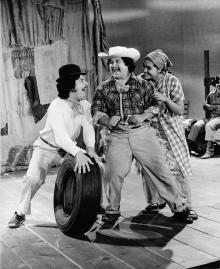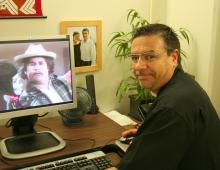

More than 100 vintage video recordings of the world- renowned Latino theater company El Teatro Campesino are now available online courtesy of the California Ethnic and Multicultural Archives (CEMA) at UC Santa Barbara's Davidson Library. The digitized videos, 118 in all, make up the Teatro Campesino Online Collection, and can be accessed on CEMA's ImaginArte Web site.
The recordings, which represent the first 25 years of El Teatro Campesino's history, include vintage theater performances, historical documentaries on the farm workers movement, scenes from the award-winning play and film "Zoot Suit," and such shows as "Rose of the Rancho," "Los Corridos," and "La Pastorela." Also part of the collection are interviews with founding director Luis Valdez and other members of the theater company, and commentaries by United Farm Workers leader César Chavez.
The most influential Latino theater company in the country, El Teatro Campesino has made major contributions to Chicano culture in the United States, and, more broadly, to the development and expansion of the boundaries of theater. The videos are a part of the theater company's archives that has recently been opened for use. The complete archives also include scripts, production notes, photographs, audio recordings, graphic art, set designs, and correspondence files.
"The Teatro Campesino Online Collection is an indispensible medium for illustrating the history of this seminal Chicano theater company," said Carlos Morton, professor of theater and dance at UCSB.
"The goal of the project was to digitize and make accessible these rare videos as a teaching and research resource about the historically important Teatro Campesino," said CEMA director Salvador Guerena. "Obsolete U-matic video recordings were reformatted into Beta SP, DVD, and streaming video. Now the vintage videos that were once at risk are both preserved and accessible on the Web."
The project, which was funded through a grant from the University of California Institute for Mexico and the United States, contributes to UC's ongoing outreach and community education efforts. The videos will help meet the growing need for teaching and research materials on the social and cultural history of the Chicano movement in this country, especially in the theater arts.
El Teatro Campesino began in 1965 with short performances for audiences of farm workers in the fields of California's central valley. Within five years, it had gained an international reputation and had inspired the formation of many other Chicano theater companies. The performances drew on traditions from European drama, such as commedia dell'arte; Spanish religious dramas adapted for teaching Mission Indians; the Mexican tradition of performances in California that began in the mid-19th century; and Aztec and Maya sacred ritual dramas. Another influence was that of Bertolt Brecht on El Teatro Campesino director Valdez, who explored the theater as a forum for political ideas.
During the company's early years, all the actors were farm workers. Valdez emphasized ensemble work, in which all actors contributed to the interpretation of the performance. Most troupe members took on multiple roles, with one person serving as an actor, technical director, company manager, and tour coordinator. Members of the Teatro created their own material, which gave them the freedom to express what they knew and felt. They often used comedy to make social statements, and humor became a major asset that added understanding and appeal to the messages of the actors.
Related Links
Teatro Campesino
California Ethnic and Multicultural Archives



